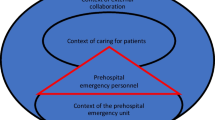Abstract
The purpose of this article is to share with the reader the specific findings on the role of nurse as consumer advocate from a study on ethical decision-making in an emergency department (ED). Qualitative interviews were conducted with 11 health professionals (doctors and nurses) working in the ED of a hospital. The interviews were audio-recorded, transcribed verbatim and thematically analysed.
In ED, where the decision-making is described as medico-centric, advocacy ipso facto necessitates a challenge to doctor decision-making. The findings indicate that ED nurses experience with advocacy varied depending on the democratic qualities and communication skills of the particular doctor who had care of the consumer. It is noted that seeing the need for advocacy does not necessarily translate into effective action, as management support is essential for productive advocacy. A phenomenon of the desire not to rock the boat was reported. The findings indicate that the support of other nurses is essential for advocacy and affirm the importance of focusing on the ethical nature of the organisation as opposed to an exclusive focus on the individual.
Similar content being viewed by others
References
Astrom, G. et. al. 1995. ‘Nurses’ skills in managing ethically difficult care situations: interpretation of nurses’ narratives’. Journal of Advanced Nursing 21(6): 1073–1080.
Atwal, A.; Caldwell, K. 2005. ‘Do all health and social care professionals interact equally?: A study of interactions in multidisciplinary teams in the United Kingdom’. Scandinavian Journal of Caring Sciences 19: 268–273.
Coombs, M.; Ersser, S. 2004. ‘Medical hegemony in decision-making — a barrier to interdisciplinary working in intensive care?’ Journal of Advanced Nursing 46: 245–252.
Corley, M. et. al. 2005. ‘Nurse moral distress and ethical work environment’. Nursing Ethics 12: 381–390.
Creswell, J.W. 2003. Research Design: Qualitative, Quantitative and Mixed Method Approaches. 2nd edn. Thousand Oaks: Sage.
Curtin, L. 1979. ‘The nurse as advocate: A philosophical foundation for nursing’. Advances in Nursing Science 1(3): 1–10.
Gadow, S. 1980. ‘Existential advocacy: Philosophical foundation of nursing’. In Nursing: Images and Ideals, edited by Spricker, S.F.; Gadow, S. New York: Springer Publishing Company.
Gaylord, N.; Grace, P. 1995. ‘Nursing advocacy: An ethic of practice’. Nursing Ethics 2(1): 11–18.
Gearing, R.E. 2004. ‘Bracketing in research: a typology’. Qualitative Health Research 14(10): 1429–1452.
Giorgi, A; Giorgi, B. 2004. ‘The descriptive phenomenological psychology-cal method’. In Qualitative Research in Psychology: Expanding Perspectives in Methodology and Design, edited by Camic, P. et. al. Washington, DC: American Psychological Association.
Grbich, C. 2007. Qualitative data analysis: An introduction. London: Sage.
Hanks, R. 2005. ‘Sphere of nursing advocacy model’. Nursing Forum 40(3): 75–78.
Hanks, R. 2007. ‘Barriers to nursing advocacy: a concept analysis’. Nursing Forum 42(4): 171–177.
Hewitt, J. 2002. ‘A critical review of the arguments debating the role of the nurse advocate’. Journal of Advanced Nursing 37: 339–445.
Holloway, I. 2008. A–Z of Qualitative Research in Healthcare. 2nd Ed. Oxford: Blackwell Publishing.
Hyland, D. 2002. ‘An exploration of the relationship between patient autonomy and patient advocacy: implications for nursing practice’. Nursing Ethics 9: 472–483.
Kohnke, M. 1982. Advocacy: Risk and Reality. St Louis: CV Mosby C.
Kvale, S. 2007. Doing Interviews. 2nd edn. Thousand Oaks: Sage.
Lothian, J. 2005. ‘The dance of advocacy’. Journal of Perinatal Education 14: 36–39.
McGrath, A.; Walker, A. 1999. ‘Nurses’ perception and experiences of advocacy’. Contemporary Nurse 8(3): 72–78.
McGrath, P. et al. 2006. ‘Patient-centred care: Qualitative findings on health professionals understanding of ethics in acute medicine’. Journal of Bioethical Inquiry 3(3): 149–160.
McGrath, P. et al. 2007. ‘Nursing advocacy in an Australian multidisciplinary context: Findings on medicocentrism’. Scandinavian Journal of the Caring Sciences 20(4): 394–402.
McGrath, P.; Henderson, D. 2008a. ‘“Oh, that’s a really hard question”: Australian findings on ethical reflection in an accident and emergency ward’. HEC Forum 20(4): 357–373.
McGrath, P.; Henderson, D. 2008b. ‘Resolving end of life ethical concerns: Important palliative care practice development issues for acute medicine in Australia’. American Journal of Hospice and Palliative Medicine 25(3): 215–222.
McGrath, P.; Holewa, H. 2006. ‘Ethical decision making in an acute medical ward: Australian findings on dealing with conflict and tension’. Ethics and Behavior 16(3): 233–252.
McSteen, K.; Peden-McAlpine, C. 2006. ‘The role of the nurse as advocate in ethically difficult care situations with dying patients’. Journal of Hospice and Palliative Nursing 8 (5): 259–269.
Mitty, E. 1991. ‘The nurse as advocate: Issues in LTC’. Nursing Health Care 12: 520–523.
Olson, L. 1998. ‘Hospital nurses’ perceptions of the ethical climate of their work setting’. Image Journal of Nursing Scholarship 30: 345–349.
Schroeter, K. 2000. ‘Advocacy in perioperative nursing practice’. Association of Perioperative Registered Nurses Journal 71: 1207.
Shirley, N. 2005. ‘Our roots in nursing: Advocacy and activism’. Nebraska Nurse May: 3.
Soderberg, A.; Norberg, A. 1993. ‘Intensive care: Situations of ethical difficulty’. Journal of Advanced Nursing 18(12): 2008–2014.
Uden, G. et al. 1995. ‘The stories of physicians, registered nurses and enrolled nurses about ethically difficult care episodes in surgical care’. Scandinavian Journal of Caring Science 9(4): 245–253.
Vaartio, H. et al. 2006. ‘Nursing advocacy; how is it defined by patients and nurses, what does it involve and how is it experienced?’ Scandinavian Journal of Caring Science 20: 282–292.
Van Manen, M. 1990. Researching lived experience. Albany: State University of New York Press.
Welchman, J.; Griener, G. 2005. ‘Patient advocacy and professional associations: Individual and collective responsibilities’. Nursing Ethics 12(3): 296–304.
Author information
Authors and Affiliations
Rights and permissions
About this article
Cite this article
McGrath, P., Phillips, E. Ethical Decision-Making In An Emergency Department. Monash Bioethics Review 28, 38–53 (2009). https://doi.org/10.1007/BF03351312
Published:
Issue Date:
DOI: https://doi.org/10.1007/BF03351312




